
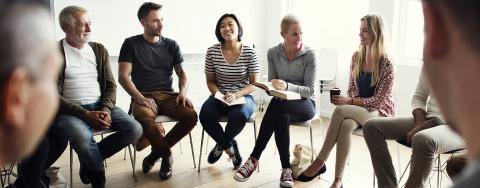
24 hours at the Patients’ University
Founded in 2009 by Catherine Tourette-Turgis, the Patients’ University (UdP) trains and graduates "expert patients" and healthcare professionals to improve the care of chronically ill patients. Let's discover this unique structure in the world and the people who make it work.
When you arrive on the third floor of the Pitié-Salpêtrière Hospital's stomatology building, you have no idea what is hidden behind one of the doors in this ordinary hospital corridor. A door that stands out because of its warmer color, less austere than the others and on which one can read in capital letters: "PATIENTS’ UNIVERSITY".
The Patients’ University
The Patients’ University is a unique educational model in the world that trains and grants diplomas to patients wishing work in education, training and advice in health care. The courses are also open to health professionals.
The UdP participates in public reflection on the role of patients in the organization of care. It also contributes to the recognition of the patient as a producer of knowledge and a useful health actor for society.
9:30 am: Welcome
As you cross the threshold of this unique university, you discover a friendly space with a lounge area and a kitchen. The smell of coffee already warms the minds and bodies numbed by the autumn cold. Large windows with half-open blinds let the light pass through and reflect on a warm wooden floor. In the middle of the room, a table with pastries. Colored armchairs invite discussion. In the cupboards, some sweets. A little further on, luminous desks, then at the back, a library with a couch and a work table.
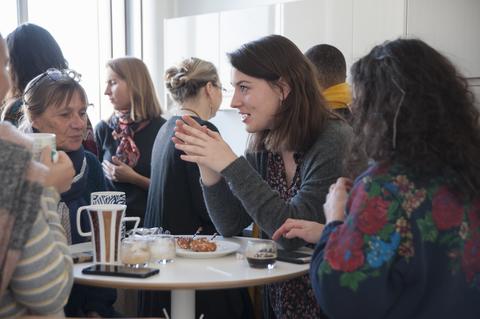
Moment de pause conviviale pour les étudiants de l’Université des Patients © Sorbonne Université – Pierre Kitmacher
"We needed a resting and listening corner for the students. Because here we welcome patients who have chronic pain, fatigue and sometimes side effects. They need to lie down or rest," explains Maryline Rébillon, associate professor of therapeutic education and training engineering. In 2016, she was responsible for fitting out the 80 square meters provided by the Faculty of Medicine. Premises that echo the pedagogy practiced here, based on listening, recognition, attention to the body and respect for dignity.
"It is important to take care of the premises because through them, people perceive the way they are considered here," adds Sihame Haba, who is in charge of communications at the UdP, which she considers her second home. She is familiar with the courses offered, having attended them as a student a few years ago, after having escaped a virulent cancer that left her with some after-effects. The fatigue with which she must relearn to live on a daily basis, this hyperactive forty-year-old never lets it show.
10:30 am: Taking Care
It's break time for the fifteen or so students who are taking classes in the next room. They come to recharge their batteries in the university's kitchen area. Each class has its own glucose reserve: a box with the name of the course where cakes, coffee and other necessities are stored for the month," explains Sihame. It's important that they feel at home." The students discuss pedagogy and "explanatory interviewing", concepts they have just covered in the course led by Marie-Paule Vannier, an academic researcher in educational sciences.
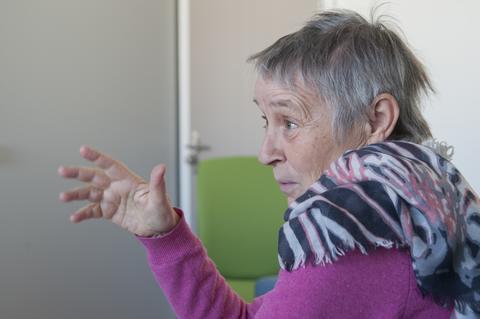
Catherine Tourette-Turgis © Sorbonne Université – Pierre Kitmacher
The door opens. The founder of the UdP, Catherine Tourette-Turgis, enters. With infinite benevolence, she takes the time to greet everyone and to inquire about the health of her colleagues. Here the expression "taking care of others" takes on its full meaning. The UdP director puts away the shopping cart she brought with her. "It's the cart from the Recovery Café," she explains. This is a café that she created for people who are in recovery from cancer and that she runs, as she did this morning, once a month at the Pitié-Salpêtrière Hospital. "It is not enough to be medically cured to be recovered," she says. The dimensions of recovery are not only medical, but also social, economic, familial, existential."
11H00: Philosophy and actions
The clock is ticking and Catherine Tourette-Turgis' agenda is full. She takes stock with Sihame of the different interviews planned for the week and the upcoming conferences. As an foreign element in the hospital world, the UdP is the subject of many articles, television reports and radio programs.
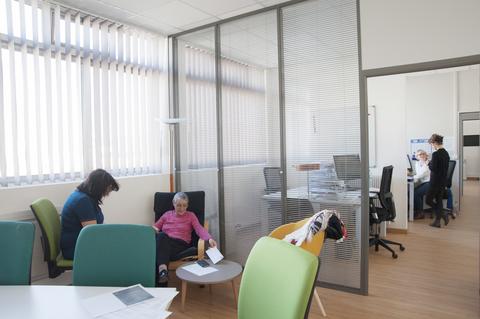
Sihame Haba et Catherine Tourette-Turgis font le point sur les conférences à venir © Sorbonne Université – Pierre Kitmacher
In the towns of Lausanne last week and Nancy in two days, the director is holding a series of conferences in order to promote her university and attract sponsors. Because UdP is also the result of an effective public-private partnership. We have received strong support from Sorbonne University, its president, the dean of the Faculty of Medicine, the Sorbonne University Foundation and the administrative services," she explains. This has resulted in the provision of staff and premises that we have renovated thanks to sponsoring."
We welcome patients who have chronic pain, fatigue and sometimes side effects due to their illness or treatments.
With 166 articles, 12 books and more than 150 presentations in 19 countries to her credit, the 60-year-old is tireless. Every morning, to get into shape, she starts her day with an hour of gym, then two hours of writing between 6 and 8 am. On weekends, she continues her work by reading her favorite philosophers. "I go from practice to theory," she explains. I start from reality and then conceptualize." That's why her life balance is "three feet": "one foot in teaching, one foot with patients and one foot in books," she says.
12:30 pm : Practicing Humanist management
Students knock on the door of the library, which also serves as the director's office from time to time. They have an appointment with her and other members of the team to discuss their situations. "Every student at UdP can call me whenever they want," says the director. She is there to accompany them, as she accompanies her team on a daily basis. "The Patients’ University brings a lot of emotions," says Catherine Tourette-Turgis. We have to deal with grief. Since 2009, three of our students have passed away. Kindness is essential. She applies this benevolence directly to her deliberately humanist management. "Here, everyone works on projects independently. I trust people. I believe that my role as a manager is to accompany them and take care of them. As a result, we have higher productivity here than one would usually expect from an administrative department."
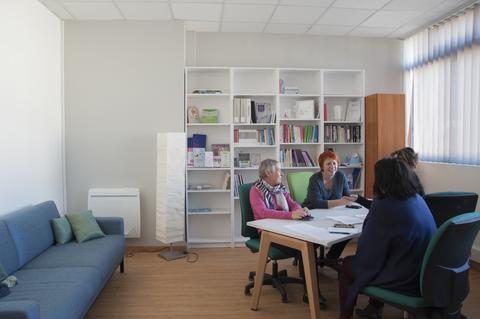
Réunion de travail sur les programmes pédagogiques © Sorbonne Université – Pierre Kitmacher
2:45 pm: Lunch on the Go
After lunch, Catherine Tourette-Turgis returns to the library where she has gathered a group of teachers to work on the design of an educational program on another chronic disease: sickle cell disease. She then continues the afternoon with another meeting to help patients turn their experience into expertise.
In the adjacent offices, UdP secretary Beatrice Graffet is busy. This retired volunteer is preparing for the graduation ceremony that takes place in January. This is an important moment for the students, who can meet many people within the health sector.

La secrétaire de l’UdP prépare la cérémonie de remise des diplômes © Sorbonne Université – Pierre Kitmacher
4:30 pm : Sharing Together
During this time, in room 333 which adjoins the premises, the students of the Master of Therapeutic Education are not idle. Installed on ergonomic chairs and desks, they work in small groups on the notions of "socioconstructivism". The teacher, Marie-Paule Vannier, insists: "UdP diplomas are not obtained in a surprise package! Proof, if any were needed, of the quality of the teaching: the former dean of the Faculty of Medicine, Serge Uzan himself, teaches in these courses alongside other university professors and renowned hospital practitioners."
In fact, applications to join the UdP are pouring in from all over France and even from abroad. Once enrolled, those who were lucky enough to be selected do not regret their choice. This is the case of Sabrina. Affected at a very young age by a rare cancer, she has been in remission for nine years. She wanted to use her experience as a patient to benefit her commitment to the Corasso association, which supports people affected by head and neck cancer. The University diploma on Health Democracy provides her with a solid foundation to pursue her project. Passionate about the courses she is taking, the young woman plans to pursue a thesis.
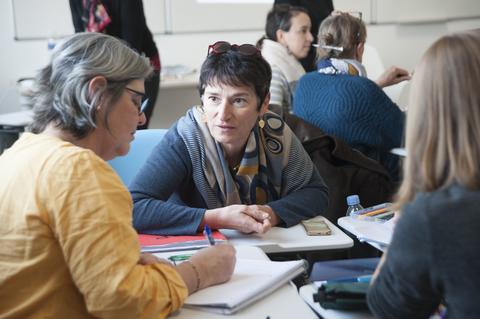
Les étudiants bénéficient de bureaux ergonomiques mobiles © Sorbonne Université – Pierre Kitmacher
The UdP also includes healthcare personnel, such as Isabelle, an oncologist at the Caen University Hospital, who wants to improve her practice and set up a therapeutic education program in her department.
6:00 pm : Continuing the Fight
Catherine Tourette-Turgis pops into the classroom. She comes to greet the teacher and the master's students before leaving for her English class. "I need to work on my English fluency because I've been invited to participate in European commissions on the future of patients," says the director. Ten years after the creation of the UdP, this woman has not finished fighting.
Catherine Tourette-Turgis, a woman always up for a fight
Following her doctorate in educational sciences from the University of Vincennes, she became an assistant professor at the age of 25, and then an associate professor at 31. In the 1980s, Catherine Tourette-Turgis became involved in social and feminist movements and the fight against AIDS alongside AIDS and Act Up. “I think that the role of an academic is to be useful to society and to make concrete proposals," she says. She is also psychosociologist and psychoanalyst, she created support systems for AIDS patients, then continued her fight in California. She spent ten years there teaching, training and deploying innovative programs for the most vulnerable populations.
"The idea of a patients' university came to me in 1997 when I found myself having to accompany AIDS patients whom I had accompanied nearing death and who were confronted with the difficult return to health thanks to the arrival of powerful treatments. They needed a place where their expertise could be recognized because they had lost everything, including the benevolent gaze of society," she says.
Back in France, she put her project into practice at the Pitié-Salpêtrière Hospital, where she was appointed associate professor in 2010. Based on public recommendations that patients should be expert actors, trained in therapeutic education and integrated into consultative and deliberative health bodies, she received the support of the Dean of the Faculty of Medicine at the time, Serge Uzan.
Key dates of the Patients’ University
- 2009

Creation of the Patients' University
- 2015

The Patients' University in Paris is officially hosted by Sorbonne University thanks to the support of the patronage and the Sorbonne University Partnership Foundation.
- 2018

